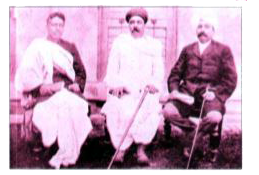How did the Congress come to change its view on Partition?
Text Solution
(i) A united India ,was the main aim of the Congress throught the nationalist struggle Congress acceptance of partition has to be viewed in the light of the political situation that faced them.
(ii)Muslim League got a poor social support in 1937 elections where it polled only 4.4% of the total Muslim vote. To create a mass base, the Muslim League increasingly began to adopt communal politics and projected itself as a sole representative of Muslim interests. The Muslim League moved the Pakistan Resolution demanding a separate state for Muslims in 1940.
(iii) The Congress could not succeed to bring Muslims masses into the nationalist mainstream and since 1937 to stem the advancing tide of Muslim communalism. Congress also failed to educate the Muslim masses politically.
(iv) The Congress high command agreed to divide Punjab into two parts ,one part would consist ,of the Hindus -Sikh majority and other part would consist of the Muslim-majority areas. The Sikhs feared that their refusal to the partition of Punjab may lead them to be over powered by the Muslims.
(vi) The same situation was in Bengal. The Bhadralok Bengali Hindus wanted to retain political power with them. As Hindus were in minority ,they favoured the partition. they believed that partition would help to retain political dominance.
|
Topper's Solved these Questions
- UNDERSTANDING PARTITION POLITICS MEMORIES , EXPERIENCES BOOK - FULL MARKSCHAPTER - UNDERSTANDING PARTITION POLITICS MEMORIES , EXPERIENCES EXERCISE - ADDITIONAL QUESTIONS SOLVED ( I. Very Short Answer Type Questions )
28 Videos
- UNDERSTANDING PARTITION POLITICS MEMORIES , EXPERIENCES BOOK - FULL MARKSCHAPTER - UNDERSTANDING PARTITION POLITICS MEMORIES , EXPERIENCES EXERCISE - ADDITIONAL QUESTIONS SOLVED ( II. Short Answer Type Questions )
10 Videos
- THROUGH THE EYES OF TRAVELLERS BOOK - FULL MARKSCHAPTER - THROUGH THE EYES OF TRAVELLERS EXERCISE - PREVIOUS YEARS BOARD QUESTIONS SOLVED
17 Videos
Similar Questions
Knowledge Check
Direction: In these questions, sentences are given with blanks to be filled in with an appropriate word(s). Four alternatives are suggested for each question. Choose the correct alternative out of the four alternatives.
How did these things come ___ ?A1) aboutB2) intoC3) atD4) downThe President of Indian National Congress at the time of partition of India was
AC. RajagopalachariBJ. B. KripalaniCJawahar Lal NehruDMaulana Abul Kalam Azad
How did the Ancon sheep come into existence ?
View SolutionHow did the landscapes of America change?
View SolutionThe conflict between the two sections of the Congress came to surface in its Session in 1906 at Calcutta. In this context explain the following:
With reference to the picture given below, answer the following:

Which section of the Congress did they represent?
View SolutionHow did the USSR come into existence?
View SolutionWhen and why did the Congress ministers in provinces resign?
View SolutionHow did they bring incredible change in the national outlook?
View Solution
